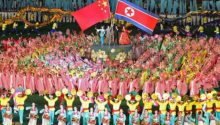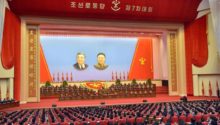contributors
Alexander Vorontsov

Head of Department of Korean and Mongolian Studies, Institute of Oriental Studies
all articles


On 2 June 2017, the UN Security Council unanimously adopted resolution 2356 on the extension of sanctions against the Democratic People’s Republic of Korea. The resolution was initiated by the United States in response to North Korea’s continued missile launches. Everyone who took part in the vote noted that adopting the resolution demonstrates the unity of the UN Security Council members and the international community in condemning North Korea’s nuclear missile programme, although that’s where the unity ends. Subsequent assessments of the document by members of the Security Council have been varied and, at times, contradictory…


Judging by South Korean President Park Geun-hye’s statement on 13 June, Seoul has decided to cut off dialogue with North Korea, demanding that Pyongyang first end its nuclear programme. As is well known, South Korea severed all communication channels with the North and closed the last collaborative economic development – a joint industrial zone in Kaesong – after North Korea conducted its fourth nuclear test and satellite launch in January-February 2016…


The year 2016 began on a worrisome note on the Korean peninsula. There has been yet another nuclear test by Pyongyang, which will have fairly long-term consequences, will trigger yet another censorious Security Council resolution with an expanded package of sanctions, and will also prompt stepped-up military activity in the region by the US, Japan, and South Korea. This will inevitably lead to a new cycle of burgeoning tension on and around the Korean peninsula…


The most recent dramatic escalation of military and political tensions on the Korean peninsula in August 2015 can be viewed from various perspectives, but what stands out is the fact that despite Seoul’s continual declarations of their desire to build trust between the North and the South, not only economic cooperation, but even meaningful dialog has ground to an almost complete halt…


In an exclusive interview with the Interfax news agency on July 29, the North Korean ambassador to Moscow, Kim Hyun Joon, stated that the Democratic People’s Republic of Korea was prepared to shore up its nuclear potential in response to US actions, the purpose of which, the ambassador emphasized, «is to overthrow the existing regime and bring about a change in the current leadership of the DPRK»…


Is there a hope for restarting the stalled six-party talks on North Korea’s nuclear program? This question is more frequently asked by experts at international conferences, including the Northeast Asia Peace and Security Mechanism event held this May in northwestern city of Yanji, the seat of the Yanbian Korean Autonomous Prefecture in eastern Jilin province, People's Republic of China…


Normally tensions run high in the Korean Peninsula when US starts annual joint military exercises with South Korea. Then the time comes for attempts to find diplomatic solutions. This is the usual pattern. It was different this year…


For North Korea the 2014 was a year of growing tensions, as well as the time of continuous economic growth that the country reached even being under international sanctions. It was also the year when military and political leadership consolidated the ranks thanks to the efforts of young Kim Jong-un. In 2014 a three-year mourningperiod for the lateleader Kim Jong Il, the father of Kim Jong-un, ended. It was also the time of increasing cooperation with friendly states, first of all Russia and China. Perhaps all these things will make the regime’s opponents realize that the hopes for the regime change in North Korea are groundless. Perhaps it will help to revive a substantive dialogue on the problems of the Korean Peninsula.


2014 was another year of lasting conflict between the Unites States and North Korea. … North Korean political culture has specific features – the national leader is treated with utmost respect as the man who enjoys a special status in the government political structure. The moral values advocated by Confucius presuppose that the supreme leader is the father of the nation and the representative of Heaven among other things. Those who are acquainted with the North Korean cultural and historic traditions are not surprised when an insult is met with a tough response. No doubt, the US is aware of the fact.


…Until Washington turns away from a paradigm based on regime change in the DPRK as soon as possible and at any cost, the door leading toward an improved relationship between the two Koreas will quickly begin to close. And yet it is the Koreans themselves who will have the last word in determining the fate of their divided people…



